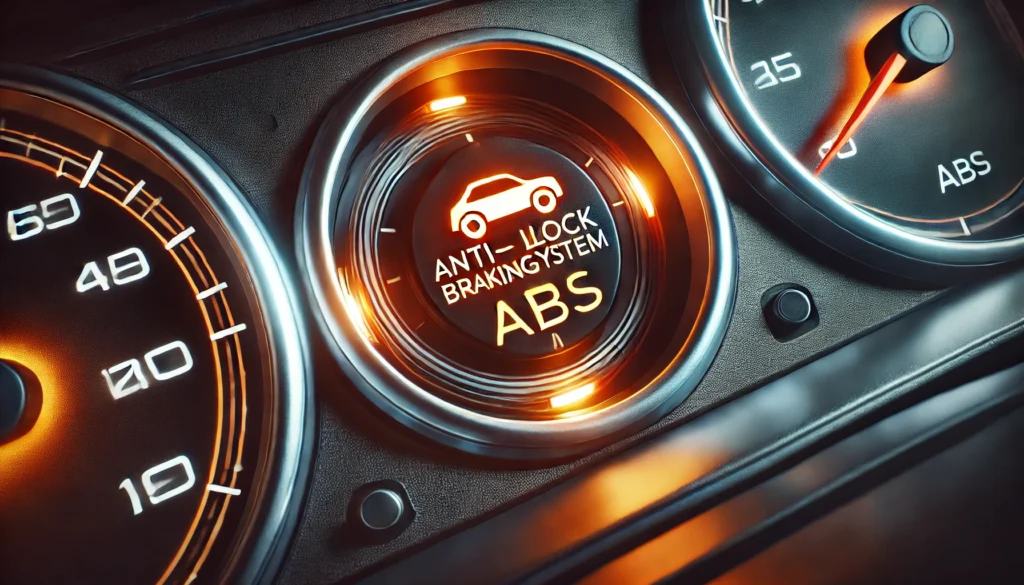Seeing the anti lock light on car‘s dashboard can be concerning, especially if you’re unsure what it means or what actions you should take. The Anti-lock Braking System (ABS) is a critical safety feature in modern vehicles, designed to prevent your wheels from locking up during heavy braking. When the anti-lock light comes on, it’s essential to understand its significance and how to address any underlying issues.

Understanding the Anti-Lock Light on Your Car
The anti-lock light, often labeled as “ABS,” is an indicator that something may be wrong with your car’s Anti-lock Braking System. This system plays a crucial role in maintaining control during emergency braking by preventing the wheels from skidding. If the anti-lock light illuminates, it suggests that the ABS is not functioning correctly, which could compromise your vehicle’s safety in certain driving conditions.
Common Reasons for the Anti-Lock Light to Turn On
- Faulty Wheel Speed Sensors: Your vehicle’s ABS relies on speed sensors located on each wheel to monitor their rotation. These sensors help the system determine if a wheel is about to lock up. If a sensor becomes dirty, damaged, or fails, it can send incorrect data to the ABS, triggering the anti-lock light.
- Low Brake Fluid Levels: Brake fluid is essential for the proper operation of your vehicle’s braking system, including the ABS. Low brake fluid levels can lead to reduced hydraulic pressure, causing the anti-lock light to come on. This is often due to a leak or worn brake pads.
- Malfunctioning ABS Module: The ABS module is the central component of the Anti-lock Braking System, responsible for processing data from the wheel speed sensors and controlling the brake pressure to each wheel. A malfunctioning module can disable the system, leading to the anti-lock light being illuminated.
- Blown Fuse or Electrical Issue: Like all electrical systems in your car, the ABS relies on fuses and relays. A blown fuse or an issue in the electrical wiring can prevent the ABS from working correctly, causing the light to turn on.
- Worn Brake Pads: Worn-out brake pads can reduce the overall effectiveness of your braking system and may trigger the ABS light if the wear is significant enough to affect the system’s performance.
Steps to Take When the Anti-Lock Light Comes On
- Check the Brake Fluid Level: Start by checking your car’s brake fluid level. If it’s low, top it off with the recommended type of brake fluid. However, if the fluid level drops frequently, it might indicate a leak that needs professional attention.
- Inspect Wheel Speed Sensors: If you’re comfortable working on your car, inspect the wheel speed sensors for any dirt, debris, or visible damage. Cleaning or replacing a faulty sensor could resolve the issue.
- Examine the ABS Fuse: Locate the fuse box in your vehicle and check the ABS fuse. If the fuse is blown, replace it. If the new fuse blows shortly after, there might be a deeper electrical issue requiring a mechanic’s expertise.
- Get a Professional Diagnosis: If the anti-lock light remains on after performing these checks, or if you’re unsure about the cause, it’s advisable to consult a mechanic. They can run a diagnostic scan to identify the problem and recommend the appropriate repairs.
- Drive with Caution: While your standard braking system will still work with the anti-lock light on, the ABS will not be there to assist you during emergency braking. Drive cautiously, especially in wet or icy conditions, until the issue is resolved.
Why You Should Address the Anti-Lock Light Promptly
Ignoring the anti-lock light on your dashboard can lead to increased risks while driving. The ABS is a critical safety feature that helps prevent accidents, particularly in poor road conditions. Without a functioning ABS, your vehicle is more likely to skid or lose control during sudden braking, which can lead to dangerous situations.
Additionally, driving with the anti-lock light on for an extended period can cause further damage to your vehicle’s braking system, potentially leading to more expensive repairs.
Conclusion
The anti-lock light on your car is a warning that should not be overlooked. Whether it’s due to something simple like low brake fluid or a more complex issue like a malfunctioning ABS module, addressing the problem as soon as possible is crucial for your safety and the longevity of your vehicle. If you see the anti-lock light on, take the necessary steps to diagnose and fix the issue, or seek professional help to ensure your car remains safe to drive.